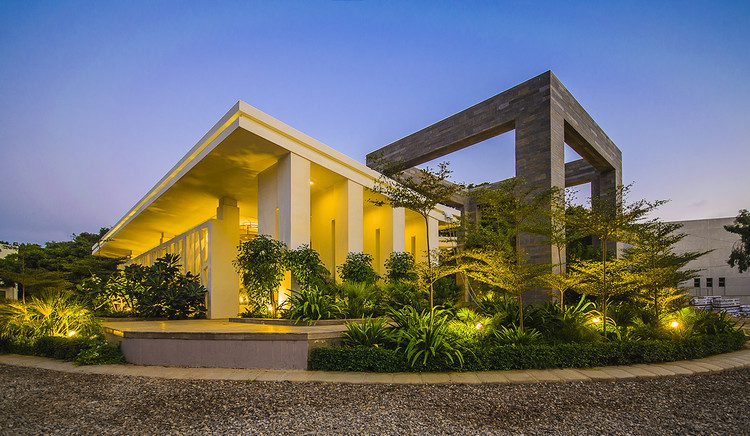Smart Building Design: How Technology is Reshaping Modern Architecture in Pakistan

Introduction
Architecture has always reflected the spirit of its time—and today, that spirit is digital. The fusion of technology with building design, commonly known as smart architecture, is revolutionizing real estate across the world. In Pakistan, the adoption of smart building design is gaining momentum, especially in high-profile projects like Falaknaz Greens, One Beverly, and The Mega Mall.
Smart buildings go beyond aesthetics; they combine energy efficiency, automation, sustainability, and user experience in ways that redefine how people interact with physical spaces. As urbanization accelerates in Pakistan, smart architecture is no longer a luxury—it’s a necessity.
What Is Smart Building Design?
A smart building uses advanced systems and technologies to monitor and control various functions such as:
Heating, ventilation, and air conditioning (HVAC)
Lighting and shading
Security systems
Energy and water usage
Occupancy levels
Connectivity and user personalization
These systems are powered by IoT sensors, AI algorithms, and cloud platforms, allowing real-time adjustments based on data and user preferences.
The Role of Smart Design in Pakistani Real Estate
1. Energy Efficiency and Sustainability
With energy shortages and rising utility costs, energy optimization is a core benefit of smart buildings.
In a project like Falaknaz Greens, this might include:
Automated lighting based on daylight levels
Smart thermostats that adjust temperature room by room
Energy monitoring dashboards for each apartment
Solar integration and smart grid compatibility
These features reduce both costs and environmental impact—making the property more attractive to eco-conscious buyers.
2. Enhanced Resident Experience
Smart buildings prioritize comfort, security, and personalization.
At One Beverly, residents might enjoy:
Mobile access to control appliances, lighting, and HVAC
Facial recognition for entry access
Smart elevators that predict peak usage
App-based visitor management and delivery systems
These experiences foster luxury living with convenience, especially for urban professionals and tech-savvy residents.
3. Intelligent Safety and Security Systems
Safety is a top concern in urban developments. Smart architecture integrates advanced features like:
Motion-activated surveillance
AI-driven fire and gas leak detection
Emergency notification systems
Automated lock-down protocols
For example, The Mega Mall can use smart crowd control systems to monitor foot traffic and avoid congestion during peak shopping hours, enhancing both safety and visitor experience.
4. Data-Driven Facility Management
Smart buildings generate a wealth of real-time data, helping facility managers:
Track maintenance needs
Monitor occupancy trends
Optimize cleaning schedules
Reduce energy and water waste
This not only improves operational efficiency but also extends the life of building systems, saving money over time.
5. Health and Well-Being
Post-pandemic, health-driven design has become crucial.
Smart buildings now integrate:
Air purification and monitoring systems
UV light sanitation in elevators or shared spaces
Touchless entry points and appliances
Occupancy-controlled ventilation
At One Beverly, for example, air quality sensors could automatically increase airflow in crowded spaces, contributing to healthier living environments.
The Business Case for Smart Buildings
For Developers:
Market differentiation through innovation
Long-term operational savings
Premium pricing potential
Easier compliance with future green regulations
For Buyers and Investors:
Reduced utility bills
Enhanced resale value
Modern amenities that match lifestyle trends
Greater sense of security and control
Smart buildings are a win-win for developers and occupants, improving both value and experience.
Smart Design in Action: The Mega Mall Example
The Mega Mall is ideally suited for advanced tech integration. Smart design can include:
AI-powered digital signage for advertising
Foot traffic heatmaps to optimize retail layouts
Mobile apps for navigation and promotions
Automated lighting and temperature control in stores
Real-time inventory sensors in retail units
These technologies boost both tenant profitability and customer satisfaction, ensuring long-term success for the project.
Challenges to Smart Architecture in Pakistan
While the potential is immense, there are some challenges:
High initial investment for smart systems
Lack of skilled professionals in smart design and implementation
Low public awareness of benefits
Regulatory gaps in tech-based construction standards
However, with rising demand and success stories from pioneers like Falaknaz Greens and One Beverly, more developers are expected to follow.
The Future of Smart Real Estate in Pakistan
In the coming years, we can expect:
Smart zoning with predictive AI to allocate building resources
Integrated building and city-wide control systems
VR-based walkthroughs for customization before construction
Smart green buildings certified by international standards
AI-enhanced design to adapt buildings to weather and occupancy changes
These innovations will redefine the Pakistani skyline, combining design, sustainability, and intelligence like never before.
Final Thoughts
Smart building design is not just a trend—it’s a transformation. For developers, it means future-ready projects. For residents, it promises safer, more efficient, and personalized living. And for investors, it offers resilience and long-term value.
As Falaknaz Greens, One Beverly, and The Mega Mall move toward smarter construction and operations, they set the benchmark for what modern real estate in Pakistan should look like: connected, intelligent, and built for tomorrow.


